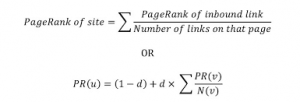- Gallagher argues that writers may often need to change their writing style and the language they want to use in order to cater to algorithms. Do you think writers necessarily need to sacrifice their use of language and the ideas they want to get across, potentially alienating real audience members, in order to cater to algorithms and get a larger overall audience? Do you think there’s a way for writers to use the language they want to use and still be noticed by algorithms?
- Do you think there’s a possibility for this idea of writing for an algorithm as an audience to be abused? Consider the rising use of bots and paid followers, for example.
Like Jordyn, I thought that algorithms distributed content based on a complicated series of math formulas that I would never be able to understand in my life. However, John Gallagher simplifies this idea of how algorithms distribute texts in “Writing for Algorithmic Audiences.” Facebook, for example, depends on three factors: user affinity, weight of content, and time decay (Gallagher 30). This ties into circulation: the more that texts are circulated between users, with high interactivity between these users such as likes, comments, and shares, the more the algorithm distributes the text to a bigger audience.

My idea of audience and the composition process have also changed due to Gallagher’s argument. He suggests that writers need to not only write for real audience members, but they also must write for non-human members, that is, Internet algorithms. Not only do writers need to use metadata such as tags in order to be noticed by Google, Facebook, etc., but he also suggests that writers need to change their desired language, because algorithms as a discourse community exert “influence over the way individuals conceptualize and express ideas” (Gallagher 29). If we take this into account, to ensure algorithms pick up a writer’s work, writing for algorithms as an audience might mean taking out language or ideas that don’t fit the values of the programmers, thus prompting writers to write their texts with algorithms as an active audience member and changing the way that writers compose their work.
The purpose of most writing is to connect with readers, whether to educate, convince, or entertain them. However, if you begin to write only to be picked up by algorithms and be seen on the first page of Google results, you might get caught up in changing your content to favor algorithms and can lose this drive to have a connection with real people. I think algorithms are an important and overlooked audience that is vital to keep in mind when writing, but writers shouldn’t overlook their main purpose: to connect with real readers.
Word Count: 454
Works Cited:
Gallagher, John R. “Writing for Algorithmic Audiences.” Computers and Composition, 2017, p. 25-35.
